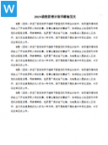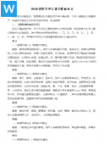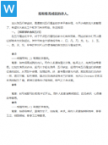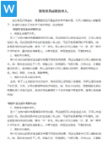






孟子语录及翻译
孟子(约公元前372年—约公元前289年),是战国时期著名的思想家、教育家,儒家学派的重要代表人物,与孔子并称“孔孟”。他的言论和观点主要体现在《孟子》一书中,以下是一些著名的孟子语录及其英文翻译:1. **人皆可以为尧舜。** (Everyone can be like Yao and Shun.) - 人皆可以为圣贤。2. **富贵不能淫,贫贱不能移,威武不能屈。此之谓大丈夫。** (Wealth or honor cannot corrupt him; poverty or obscurity cannot change his character; nor can the power of arms bend him. This is what constitutes a real man.) - 富贵不能使他放纵,贫贱不能使他改变,威武不能使他屈服。这才是真正的人。3. **老吾老,以及人之老;幼吾幼,以及人之幼。** (Respect the elderly in your family and extend that respect to others' elderly; care for your own children and extend that care to others' children.) - 尊重自己的长辈,进而尊重别人的长辈;爱护自己的孩子,进而爱护别人的孩子。4. **人之所不学而能者,其良能也;所不虑而知者,其良知也。** (There are things humans are able to do without learning them, which are innate abilities; and there are things they can know without thinking about them, which are innate knowledge.) - 人们不需要学习就能做到的事情,是他们的本能;不需要思考就能知道的事情,是他们的天性。5. **鱼,我所欲也;熊掌,亦我所欲也。二者不可得兼,舍鱼而取熊掌者也。生,亦我所欲也;义,亦我所欲也。二者不可得兼,舍生而取义者也。** (Fish is desirable, and so is the bear's paw. If you cannot have both, choose the bear's paw. Life is desirable, and so is righteousness. If you cannot have both, choose righteousness and abandon life.) - 鱼是我想要的,熊掌也是我想要的。两者不能同时拥有,我会选择熊掌。生命是我想要的,正义也是我想要的。两者不能同时拥有,我会选择正义而放弃生命。6. **孔子登东山而小鲁,登泰山而小天下。** (Zhuangzi tells us: "If Confucius climbed Mount Tai, he would feel small compared to the world; if he climbed Mount Huainan, he would feel small compared to the universe.") - 孔子登东山,对鲁国的景物觉得小;登泰山,对天下的景物觉得小。以上语录体现了孟子对于人性、道德、政治和教育等多方面的深刻见解,是中国古代哲学的重要组成部分。
### 1. **人皆可以为尧舜。** (Everyone can be like Yao and Shun.)**用法:** 这句话鼓励每个人都有成为伟大人物或实现高尚道德潜力的可能性。它强调了道德与智慧的普遍性。**例子:** “我相信,每个人内心都蕴藏着成为杰出领导者的种子。通过教育和自我提升,任何人都可以为社会做出积极贡献,像历史上的伟大人物一样。”### 2. **富贵不能淫,贫贱不能移,威武不能屈。此之谓大丈夫。** (Wealth or honor cannot corrupt him; poverty or obscurity cannot change his character; nor can the power of arms bend him. This is what constitutes a real man.)**用法:** 强调了坚韧不拔、坚持原则的人格特质。这句话用于表扬那些不因外在环境的变化而改变内心价值的人。**例子:** “在这个充满诱惑和压力的时代,能够坚守内心原则、不被财富、权力和威逼所动摇的人,正是我们社会所需的‘大丈夫’。”### 3. **老吾老,以及人之老;幼吾幼,以及人之幼。** (Respect the elderly in your family and extend that respect to others' elderly; care for your own children and extend that care to others' children.)**用法:** 推崇尊敬老人和关爱幼小的道德行为,同时鼓励社会成员之间的相互帮助和关怀。**例子:** “在我们的社区活动中,不仅要照顾好自己家庭的老人和孩子,还应该关注和帮助社区里的每一个老人和孩子,营造一个充满爱心和互助的环境。”### 4. **人之所不学而能者,其良能也;所不虑而知者,其良知也。** (There are things humans are able to do without learning them, which are innate abilities; and there are things they can know without thinking about them, which are innate knowledge.)**用法:** 强调了人类天生拥有的能力和知识,不需经过后天学习就具有的能力。**例子:** “儿童在学习阅读之前就能通过观察和模仿掌握语言能力,这说明语言是人类的一种‘良能’,而无需专门学习。”### 5. **鱼,我所欲也;熊掌,亦我所欲也。二者不可得兼,舍鱼而取熊掌者也。生,亦我所欲也;义,亦我所欲也。二者不可得兼,舍生而取义者也。** (Fish is desirable, and so is the bear's paw. If you cannot have both, choose the bear's paw. Life is desirable, and so is righteousness. If you cannot have both, choose righteousness and abandon life.)**用法:** 这句话展现了面对选择时的道德考量,强调了在必要时牺牲物质利益以坚守正义的价值观。**例子:** “在道德与个人利益冲突时,我们需要像孟子所提倡的那样,选择正义而非放弃原则,这是一代代人道德决策的核心。”### 6. **孔子登东山而小鲁,登泰山而小天下。** (Zhuangzi tells us: "If Confucius climbed Mount Tai, he would feel small compared to the world; if he climbed Mount Huainan, he would feel small compared to the universe.")**用法:** 这句话通过描绘孔子的自我反思,强调了知识的无止境和学习的追求。**例子:** “站在学术的峰巅,我们或许会觉得自己的贡献微不足道。然而,正是这种谦逊的态度激励我们持续探索,永不停息地追求知识的真谛。”这些语录体现了孟子对于人性、道德、政治和教育的深刻理解,激励着人们追求更高的道德境界和智慧。
最新句子素材
句子素材排行
- 1 关于环保的美文美段
- 2 充满阳光的句子简短
- 3 保护环境的简短句
- 4 佛经经典名句关于放下
- 5 2020奋斗励志句子
- 6 人生精辟的正能量句子
- 7 特别吸引人的交友宣言
- 8 关于读书的名言警句句子
- 9 中国名人名言100句
- 10 斯大林名言



